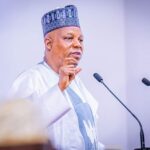The Senate and House of Representatives Joint Committee on Water Resources have stated that Nigeria must harness the full potential of its dams across the country to ensure food security.
They asserted the joint budget defence sitting with the Minister of Water Resources and Sanitation, Prof. Joseph Terlumun Utsev held by the Committee at the House of Representatives on Tuesday.
The Committee was chaired in the Senate by Senator Abdulaziz Yari (APC, Zamfara and Sada Soli Jibia (APC, Katsina) in the House of Representatives.
In his opening remarks, the Chairman of the House Committee on Water Resources, Sada Soli Jibia (APC, Katsina) said that water and sanitation are relevant to national food security as such the sector must be fully utilised for the benefit of Nigeria and its citizens.
- NIGERIA DAILY: Why Nigeria Hasn’t Won CAF Awards In 24 Years
- Abuja turning into slum-Surveyor-General
He said, “Put in mind the importance of water and sanitation and its relevance to the National Food Security as declared by the president.
“For the possible lack of rain agriculture due to desertification and climate change, all hands must be on deck to improve the capacity of our dam reservoirs to harness their full potential”.
Rep. Jibia lamented that lack of access to clean water impeded the achievement of Sustainable Development Goals (SDGs) Goal No. 6, which seeks to ensure the availability and sustainable management of water and sanitation for all by the year 2030.
He further noted that a World Bank report has shown that, only 6% of Nigerian households have access to clean, safe and portable drinking water.
The lawmaker said Nigeria must strive to make use of its abundant water resources potential to improve the socio-economic wellbeing of the country.
On his part, his Senate counterpart, Senator Abdulaziz Yari said, the committees are committed to working with all stakeholders as well as the executive to actualise the plan to make the water sector a viable player in the nation’s economy.
In his submission, the minister said the ministry is working with key stakeholders in the sector including the three tiers of government, development partners as well as the private sector and communities.
He said, “From 2016 to date, Development partners (World Bank, UNICEF, AfDB) have supported the implementation of programmes like TRIMMING, SURWASH, PIDACC, etc.
“The ministry also partners with line ministries and state governments in the implementation of the PEWASH programme, Open Defecation Free (ODF) campaign. The private sector supports the ODF campaign and the provision of water and sanitation facilities.

 Join Daily Trust WhatsApp Community For Quick Access To News and Happenings Around You.
Join Daily Trust WhatsApp Community For Quick Access To News and Happenings Around You.


